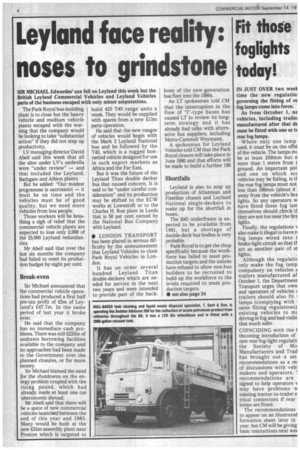Leyland face reality: noses to grindstone
Page 6

If you've noticed an error in this article please click here to report it so we can fix it.
SIR MICHAEL Edwardes' axe fell on Leyland this week but the British Leyland Commercial Vehicles and Leyland Vehicles parts of the business escaped with only minor amputations.
The Park Royal bus-building plant is to close but the heavy vehicle and medium vehicle plants escaped with the warning that the company would be looking to take "substantial action" if they did not step up productivity.
LV managing director David Abell said this week that all the sites under LV's umbrella were "under review" — and that included the Leyland, Bathgate and Albion plants.
But he added: "Our modest programme is sacrosanct — it must be on time and the vehicles must be of good quality, but we need more vehicles from less people.
Those workers will be breathing a sigh of relief that the commercial vehicle plants are expected to lose only 2,000 of the 25,000 Leyland redundancies.
Mr Abell said that over the last six months the company had failed to meet its production budget by eight per cent.
Break-even
Sir Michael announced that the commercial vehicle operations had produced a first half pre-tax profit of £5m of Leyland's £47.7m. In the same period of last year it broke even.
He said that the company has no immediate cash problems. There was still £225m of undrawn borrowing facilities available to the company and no approaches had been made to the Government over the planned closures, or for more money.
Sir Michael blamed the need for the shutdowns on the energy problem coupled with the rising pound, which had already made at least one car uneconomic abroad.
Mr Abell said that there will be a spate of new commercial vehicles launched between the end of this year and 1983. Many would be built at the new £32m assembly plant near Preston which is targeted to build 425 T45 range units a week. They would be supplied with spares from a new £13m parts operation.
He said that the new ranges of vehicles would begin with the Mark 2 Leyland National bus and be followed by the T43, which is a rugged bonnetted vehicle designed for use in such export markets as Africa and the Far East.
But it was the future of the Leyland Titan double decker bus that caused concern. It is said to be "under careful consideration" and its production may be shifted to the ECW works at Lowestoft or to the Charles H. Roe plant in Leeds that is 50 per cent owned by the National Bus Company with Leyland.
• LONDON TRANSPORT has been placed in serious difficulty by the announcement that Leyland Vehicles to close Park Royal Vehicles in London.
It has on order several hundred Leyland Titan double-deckers which are needed for service in the next two years and were intended to provide part of the back bone of the new-generation bus fleet into the 1980s.
An LT spokesman told CM that the interruption in the flow of 'T'-type buses has caused LT to review its longterm strategy and it has already had talks with alternative bus suppliers, including Metro-Cammell Weymann.
A spokesman for Leyland Vehicles told CM that the Park Royal closure will take place in June 1980 and that efforts will be made to build a further 180
Shortfalls
Leyland is also to step up production of Atlantean and Fleetline chassis and Leyland National single-deckers to make up for the shortfall in buses.
The B45 underframe is expected to be available from 1981, but a shortage of double-deck bus bodies is very probable.
Park Royal is to get the chop specifically because the workforce has failed to meet production targets and the unions have refused to allow non-bus builders to be recruited to build up the workforce to the levels required to meet production targets.
• see also page 24




















































































































































